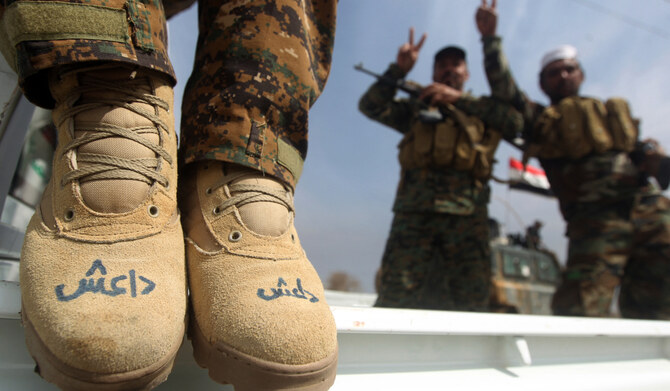
- ARAB NEWS
- 06 Jul 2025

The persistent threat posed by Daesh is a stark reminder that terrorism remains a major concern worldwide. Even though significant efforts have been made to weaken it, the group has shown a troubling ability to adapt and continue its operations. This threat extends beyond the Middle East and poses a danger to the global community.
As a result, it is crucial to maintain strong security measures, especially regarding America’s borders, to prevent terrorists from entering the country.
Recent events have brought the threat of the terrorist group back into focus. The CIA last month helped to stop a plot to attack a Taylor Swift concert in Vienna. According to CIA Deputy Director David Cohen, suspects linked to Daesh were planning to kill “tens of thousands” of concertgoers. This plot was in its advanced stages and could have resulted in a horrific mass-casualty event. However, thanks to the intelligence shared by the CIA, Austrian authorities were able to arrest the suspects and prevent a tragedy. This plot was a sobering reminder that Daesh and its followers are still capable of causing great harm.
Unfortunately, this was not an isolated case. So far this year, Daesh has claimed responsibility for multiple attacks in Turkiye, Iran and Russia, with affiliates also involved in violent incidents in Germany and other countries. The US Central Command reported that the terrorist group was responsible for 153 attacks in Iraq and Syria in the first half of 2024, indicating that the group’s violent activities are far from over.
The danger extends to other regions as well. Daesh-Khorasan, a branch of the original group, has shown its ability to carry out attacks both within Afghanistan and outside its borders. The deadly terrorist attacks in Kerman, Iran, on Jan. 3 and in Moscow on March 22, which killed hundreds, highlight the global reach of Daesh’s extremist ideology.
Robert Wood, the US alternative representative for special political affairs, last month spoke about these concerns at the UN Security Council. He pointed out that the threat from Daesh is also spreading across Africa, where instability and weak governments make it easier for terrorist groups to operate. The situation in Africa is particularly worrying. Regions like the Sahel and West, Central and Southern Africa are becoming more unstable, allowing Daesh and Al-Qaeda affiliates to gain strength. “We continue to provide our African partners essential assistance in degrading the capabilities of and countering ISIS and Al-Qaeda affiliates, in a manner consistent with international law,” Wood said, using another term for Daesh. He emphasized that vigorous law enforcement and security measures are vital to stopping terrorism and violent extremism.
The global fight against terrorism is not just about military action, it requires addressing the root causes of extremism.
Dalia Al-Aqidi
The situation is even more complex because of the ongoing instability in several parts of Africa, where governments struggle to maintain control. The Sahel region, in particular, has seen a surge in violent extremism, with Daesh and Al-Qaeda affiliates gaining significant ground. The porous borders in these regions make it easier for terrorist groups to move weapons, fighters and supplies, further complicating efforts to combat them.
Therefore, Washington and its allies must continue to support these regions, not only through military aid but also by helping to strengthen governance and economic stability.
The global fight against terrorism is not just about military action, it requires addressing the root causes of extremism, such as poverty, corruption and social inequality. Without addressing these deeper issues, terrorist groups like Daesh will continue to find new recruits and maintain their influence.
Despite these efforts, the battle against Daesh is far from over. The group still has about 2,500 fighters in Iraq and Syria and it continues to operate through cells and affiliate organizations in West and North Africa. Daesh also has a troubling ability to recruit members all around the world, particularly in Europe. The group often targets immigrants or the children of immigrants who feel marginalized, exploiting their grievances to draw them into its ranks. These recruits are usually found in crowded urban areas with high unemployment rates, making them vulnerable to extremist influence.
The number of former Daesh fighters and sympathizers living in Europe and the US is unknown, adding another layer of complexity to the fight against terrorism. In America, there are growing concerns that Daesh operatives could exploit weaknesses in the immigration system to enter the country. FBI Director Christopher Wray in June warned the US Senate that “dangerous persons” could be among those crossing the country’s southern border. He mentioned a specific network with ties to Daesh that is involved in smuggling people into the country, highlighting the need for a strong and coordinated response.
This brings us to the critical issue of border security. The idea that terrorists could cross the border and enter the US is not just a theory; it is a real risk. While the debate over immigration policy often divides along party lines, the need to secure the nation’s borders should be a shared concern. Striking a balance between compassion for those seeking a better life and the need to protect national security is challenging but essential. Ensuring that those who enter the country are properly vetted is not just a matter of policy — it is a matter of safety.
By ensuring that the borders are secure and that all individuals entering the country are properly vetted, the US can significantly reduce the risk of terrorist attacks. It is essential to remember that the fight against terrorism is ongoing and requires vigilance, cooperation and a commitment to protecting the nation from those who seek to do harm.
This approach will help ensure the nation remains a safe and secure place for all its citizens, while leading the global efforts to fight terrorism.
• Dalia Al-Aqidi is executive director at the American Center for Counter Extremism.